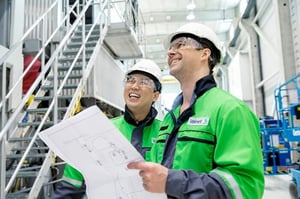
Success stories
Discover how Pinja brings clarity and control to our customers’ complex operations. These customer stories show how our solutions turn data into tangible, measurable business outcomes across industries.
-
All
-
Wood & Forestry
-
Bioenergy & recycling
-
Manufacturing
-
Food & Beverage
-
Services
-
Public
-
Mobility & Inspections

Read the success story
FORESTRY OPERATIONSKoskisen brings predictability to its 1M+ tree forest operations
Read the success story →
Read the success story
Read the success story
ENERGY OPERATIONSHelen automated RED III reporting for nearly 10,000 fuel loads a year
Read the success story →
Read the success story
Read the success story
MAINTENANCE OPERATIONSValmet increases uptime and controls costs across 7 global units
Read the success story →
Read the success story
Read the success story
SOLID WOOD OPERATIONSReal-time stock visibility for Vara Saeveski’s 120,000 m³ timber operation
Read the success story →
Read the success story
Read the success story
MANUFACTURING CLOUDPurso improves delivery reliability with fully connected, data-driven aluminium production
Read the success story →
Read the success story
Read The Success story
FOOD & BEVERAGE CLOUDOlvi boosts canning line efficiency by 15% via real-time monitoring
Read the success story →
Read The Success story
Read The Success story
SALES & DELIVERY OPERATIONSTrendi Kaihdin supports rapid growth with a centralised ERP system
Read the success story →
Read The Success story
Read the success story
DIGITAL OPERATIONS & PLATFORMEvondos achieves 99.5% dosing accuracy with medical device software built with Pinja
Read the success story →
Read the success story
Read the success story
DATA & INTELLIGENCEEkokymppi automates key operations with Microsoft Fabric
Read the success story →
Read the success story
Read the success story
DIGITAL COMMERCEUrjalan Makeistukku handles 5x turnover with a scalable eCommerce setup
Read the success story →
Read the success story
Read the success story
DATA & INTELLIGENCEFrom 12 hours to 15 minutes: HUS transforms operational reporting
Read the success story →
Read the success story
Read the success story
MUSTERCarspect streamlines 1 million inspections per year on a customer-centric ERP
Read the success story →
Read the success story
Read the success story
MATERIAL FLOWEkokymppi speeds up material processing with mobile weighing for 70% of trucks
Read the success story →
Read the success story
Read the success story
REAL-TIME MONITORINGHiab accelerates growth by reducing downtime with instant production alerts